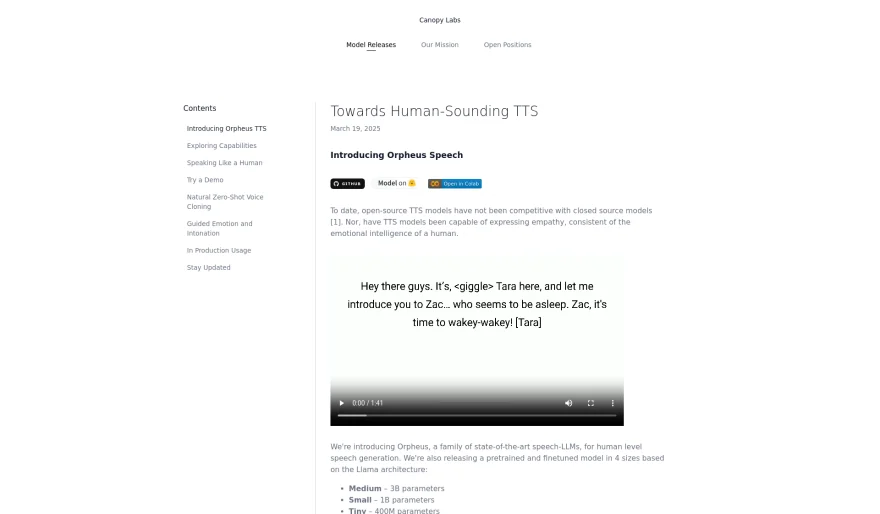Stay Ahead of the Curve
Latest AI news, expert analysis, bold opinions, and key trends — delivered to your inbox.
Orpheus: A Leap Forward in Open-Source Text-to-Speech Technology
3 min read Orpheus, a new open-source TTS model, claims to surpass ElevenLabs and OpenAI with human-like speech, zero-shot voice cloning, and 100ms latency. Free under Apache 2.0, it’s set to revolutionize text-to-speech tech. March 19, 2025 22:46
As of March 19, 2025, the open-source text-to-speech (TTS) model Orpheus
is making waves in the AI community. According to recent posts on X,
Orpheus claims to surpass both open-source and closed-source models like
ElevenLabs and OpenAI in quality and versatility. Here’s what we know so far:
What is Orpheus?
Orpheus is a family of pretrained and fine-tuned TTS models, with the primary model featuring 3 billion parameters (3B). Smaller variants—1B, 500M, and 150M—are expected to roll out in the coming days.
Key Capabilities
High-Quality Speech: Delivers aesthetically pleasing, natural, and emotive speech generation, even with smaller model sizes.
Zero-Shot Voice Cloning: Mimics voices with minimal input, offering impressive accuracy.
Emotional Intelligence: Produces non-textual cues like sighing, laughing, and chuckling, adding a human-like touch to speech.
Low Latency: Supports input and output streaming with a latency of just 100 milliseconds.
Training and Licensing
Training Data: Trained on 100,000 hours of audio data, enabling robust performance across diverse use cases.
Licensing: Released under the Apache 2.0 license, making it freely available for open-source use.
Why This Matters
Orpheus aims to bridge the gap between open-source and closed-source TTS models, offering capabilities that rival or exceed industry leaders like ElevenLabs and OpenAI. Its focus on emotional intelligence and low latency positions it as a game-changer for applications in entertainment, accessibility, and more.
Current Status
While the claims about Orpheus are promising, they are primarily based on social media posts as of March 19, 2025. Official documentation, whitepapers, or detailed technical reports are yet to be released, so these details should be treated as preliminary.
For the latest updates, keep an eye on official developer announcements or platforms like GitHub, where the smaller model variants are expected to be released soon. Benchmarks comparing Orpheus to established models like ElevenLabs and OpenAI may also emerge, providing a clearer picture of its performance.



















 AI Agents
AI Agents